Talk Show 7: Julianna Baggott, Lisa Borders, Maria Flook, Antonya Nelson, Darin Strauss
08.01.08
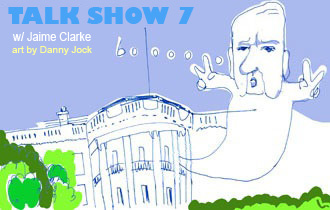 TALK SHOW 7: Monumental Pop Culture
TALK SHOW 7: Monumental Pop Culture
Julianna Baggott is the author of four novels for adults, and three books of poems, most recently Compulsions of Silkworms and Bees. She also writes novels for younger readers under the pen name N.E. Bode––and her Bode novel on the Boston Red Sox––The Prince of Fenway Park––will come out in spring of 2009. For more on Baggott: www.juliannabaggott.com. For more on Bode: www.theanybodies.com.
Lisa Borders’ first novel, Cloud Cuckoo Land, was chosen by Pat Conroy as the winner of River City Publishing’s Fred Bonnie Award for Best First Novel and was published in 2002. Lisa has been nominated for a Pushcart Prize and her short stories have appeared in Kalliope, Washington Square, Black Warrior Review, Painted Bride Quarterly, CrossConnect and other journals. Visit Lisa at www.lisaborders.com.
Maria Flook is the author of two works of nonfiction, Invisible Eden: A Story of Love and Murder on Cape Cod and My Sister Life, The Story of My Sister’s Disappearance; three novels, Open Water, Family Night (which received a PEN American /Ernest Hemingway Foundation Special Citation), and Lux; and a collection of short stories, You Have the Wrong Man. She teaches at Emerson College. Visit Maria at mariaflook.com.
Antonya Nelson is the author of eight books of fiction, the most recent of which is SOME FUN (stories and a novella; Scribner). She teaches in the U of Houston creative writing program.
Darin Strauss is the award-winning author of the national and international bestseller Chang and Eng and The Real McCoy. His new novel, More Than It Hurts You, will be published next June. He teaches at New York University and lives in Brooklyn, NY. Visit Darin at www.darinstrauss.com.
—Name the most significant pop culture event in your lifetime.
Baggott: I certainly can’t be responsible for a task of such magnitude. I’m barely allowed to drive a car. I’ve never even been chosen as secretary at our departmental meetings because I’m prone to hyperbole. (But, later, when pressed, I’ll cough up a Red Sox moment. Scroll down.)
Borders: The Partridge Family––the TV show, the prefab pop band, and, most importantly, the show’s star David Cassidy, he of the shaggy mane and puka-shell necklaces, the ruffles and red velvet. You have to respect a guy who can pull off ruffles and red velvet while playing a character named Keith Partridge.
Flook: Seeing Janis Joplin at Newport Folk Festival, 1968.
Nelson: I wonder if Watergate counts as pop culture? Certainly it was the only show we watched, one dull summer. My parents were so into it––they who disdained television and soap operas, tuned in like any bored housewife, ready to see what was going to come out of those people’s mouths next.
Strauss: Unfortunately, the release of Michael Jackson’s Thriller. The album was neither as bad as is claimed by its embarrassed ex-devotees (everyone, basically), nor good enough to have caused the stir it did. A cultural phenomenon, like any whirlwind, is hard to predict. Some products, like local cloud systems, just drift over the country. You can’t forecast which stories might gather force and momentum, which Airstream will go squally and funnelform until it tornadoes out into national attention.
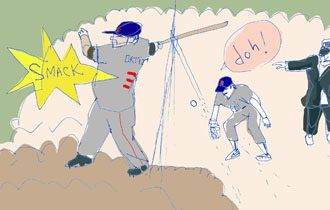 —Where were you when you experienced this event?
—Where were you when you experienced this event?
Baggott: Since I got this assignment a few days ago, my husband will randomly shout out things like: the death of Princess Diana and the costume malfunction of Janet Jackson and OJ’s white Bronco on the LA freeway? And I’ve come to realize that I live in Baggottland––just south of Jungleland––and I receive dispatches from the real world via the wobbly negotiations of something like a carrier pigeon or singing telegram. “I don’t know where I am at any given moment,” I say. “I’m in my head, I think.” And this is sad, sad, sad.
Borders: The year was 1970; I was seven years old and living in Keyport, New Jersey, a 1.4-square-mile parcel of swampland. I’d had crushes before––on Davy Jones, on Batman’s sidekick Robin, and even, strangely enough, on the cartoon character Underdog. But nothing could have prepared me for what David Cassidy and the Partridge Family were about to do to me––emotionally, hormonally, music-fanatically––as they began to appear on the black-and-white TV in our living room each Friday night. (I successfully begged my parents for a color TV shortly after Partridge mania began.)
Flook: I was fifteen and traveled to Newport with my older hippie sister in her VW Micro bus. She had just left her husband and was doing this wild-ass reinvention thing. I was on probation for stealing cars in Wilmington, DE. It was this intense sister thing. We cleaved to one another! We picked up two hitchers, college boys from Kent State (two years before the shoot out), and I ended up sleeping with one of the guys in a sand dune. I had to remove my retainer when he kissed me, and remember to put it back each time so it wouldn’t get lost.
Nelson: We didn’t even have a decent television or reception, then. We were in a tiny town in Colorado that got exactly one channel. On it was whatever the regional station manager declared worthy. Maybe that’s why Watergate seemed so incredibly omnipresent.
Strauss: In the slow lane of a steep puberty.
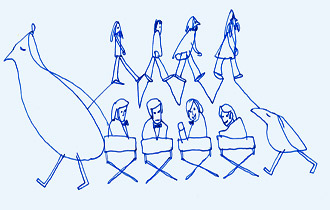 —What, in your opinion, fuels the longevity of this event in pop culture?
—What, in your opinion, fuels the longevity of this event in pop culture?
Baggott: Well, there’s a scientific hypothesis––which I heard once, but don’t remember where I was when I heard it––that memory cannot exist until one memory can refer to another memory … something like memory only exists when it stands for another memory––basically metaphor has to exist. This is an argument the likes of Is there thought before language, which Helen Keller weighed in on in the category of No, there isn’t. This is supposed to explain why people don’t remember infancy. I think that infancy is overshadowed by an enormous haze of Existential Angst (I exist? I exist?) and little else can be perceived. But, if I were to pick, say the Boston Red Sox winning game four in the Red Sox vs. Yankees play-offs in 2004––in fact, let’s be more narrow: Big Papi’s homerun in the bottom of the twelfth (which then allows us to deal with the racism that plagued the Red Sox franchise)––then that pop culture moment relies on, well, the racism that plagued Red Sox franchise––like the hateful charade of the try-out of Jackie Robinson and the Sox scout who refused to wait out a rain delay to see Willie Mays play, and the horrible treatment of the sweet Pumpsie Green. And, obviously, all of this relies on Bill Buckner, and the ball bouncing through his legs.
Borders: The Partridge Family will not die out until my generation of girls who grew up in the seventies dies out, or until Danny Bonaduce stops doing reality shows (whichever comes first). I wish I could say that the Partridge Family’s music would endure, that “I Think I Love You” is a classic rock song on the order of “Thunder Road” or “Smells Like Teen Spirit,” but, well, it’s not even “My Sharona.”
Flook: I, like millions of white kids across America, had to make a choice to leave behind the past; for some it was the Beach Boys and the Association, but for me it was a lifetime of Vanguard recordings. At the Folk Festival, my sister wanted to go to the Pete Seeger hootenanny that ran at the same time Janis was supposed to perform in another arena, but for me and the Kent State boys it was Janis or bust! In truth, I hate Janis Joplin, but there was this incredible feeling that her unpleasant screeching was directly aimed at people’s parents and at Nixon.
Nelson: As for why it’s remained so current: it was the beginning of deep and proven suspicion concerning our government. What glee my parents expressed, hearing Nixon hang himself, again and again and again. Since then, every major news event that features shameful government behavior has been labeled Whatevergate. It’s like people who decide they are shopaholics or chocoholics, since alcohol got the whole thing rolling.
Strauss: Not sure it’s had much longevity; isn’t that the thing about Pop culture––it’s disposability? This album, which seemed indispensable, is almost never listened to anymore. Not by me, at least. Except for “Wanna Be Startin’ Somethin,'” which––with its cool Funkadelic and Manu Dibango rip-offs––is a great compendium of funky tropes.
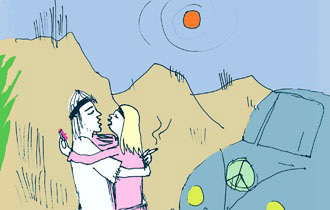 —What pop culture event do you think precedes it?
—What pop culture event do you think precedes it?
Baggott: If I had to really choose the most important SPORTS pop culture event, it couldn’t really be that Red Sox game. It would have to be the Miracle Game––the Olympic gold medal game of the US vs. USSR in 1980, mid Iranian Hostage Crisis.
Borders: I’ve read that The Partridge Family was loosely modeled on the 1960s band the Cowsills, none of whom rocked their bell bottoms quite the way David Cassidy did. The Monkees’ TV show (which was itself a rip-off of the Beatles’ “A Hard Days’ Night”) was probably the most direct television predecessor. And I liked the Monkees, especially the shots with their surfboards in the opening credits, but the Monkees were missing the Partridges’ secret weapon: David Cassidy.
Flook: Dylan’s first electric appearance at the Folk Festival.
Nelson: The event that precedes Watergate, in my mind anyway, is JFK’s assassination. The two events, a decade apart, couldn’t be more different in tone. The nation couldn’t have responded more oppositely: one was the end of innocence, the other was the beginning of cynicism. They seem like two sides of a single coin, defining events in the center of the century.
Strauss: At the time, people were saying Elvis and the Beatles; nowadays, it seems clear that those musicians had a more lasting impact than MJ did. Not sure there was ever a pop artist who was so huge and then basically went forgotten: Bing Crosby, maybe?
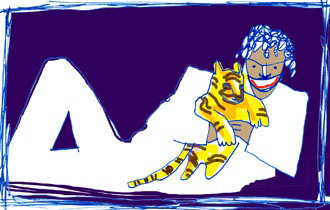 —What more would you like to know about the event?
—What more would you like to know about the event?
Borders: Where do I begin? As a child, I always wanted to know how Suzanne Crough landed the role of Tracy; she hit that tambourine like she was on valium, her mouth hanging open and never, never on the beat, and I knew even at age seven that I could have done better. I’d like to know what happened to Simone, the dog who was the Partridges’ pet for one season and then mysteriously, inexplicably vanished (much like Tiger from the Brady Bunch). I’d also like to know if Susan Dey really did turn orange from eating so many carrots in an anorexic quest for extreme thinness, as urban legend and at least one behind-the-scenes, made-for-TV movie have asserted. Finally, I’d like to know if David Cassidy remembers as I do that concert at the Garden State Arts Center in 1971, the little girl in the purple dress with front row seats who nearly went catatonic when he took the stage in his white fringe jumpsuit, a little girl who must have looked so wigged that he actually uttered into the mike, “Little girl in the purple dress, are you alright?” That little girl would never be alright again, for she was from that moment on conditioned to pretty much only be attracted to guys with guitars (the white fringe jumpsuits, not so much).
Flook: My sister went back to East Lansing, but I’d love to know what happened to the hitch hikers we spent three days with. Are they bankers? Walmart executives? or like me, did they choose literature or art, and like me did they become totally “bent” and try to live up to their potential. Although, thanks to the retainer, my teeth are beautifully straight.
Nelson: I feel like I don’t ever want to know anymore about Watergate, but it keeps being delivered, unsolicited, to me. There’s always some new information, extra tapes, more footage, etc. Maybe Watergate was also the beginning of TMI.
Strauss: Why I spent all my money on a leather/mesh-combo jacket and flood-water pants, and why I wasted the Summer of 1984 trying to perfect my frontward moonwalk.